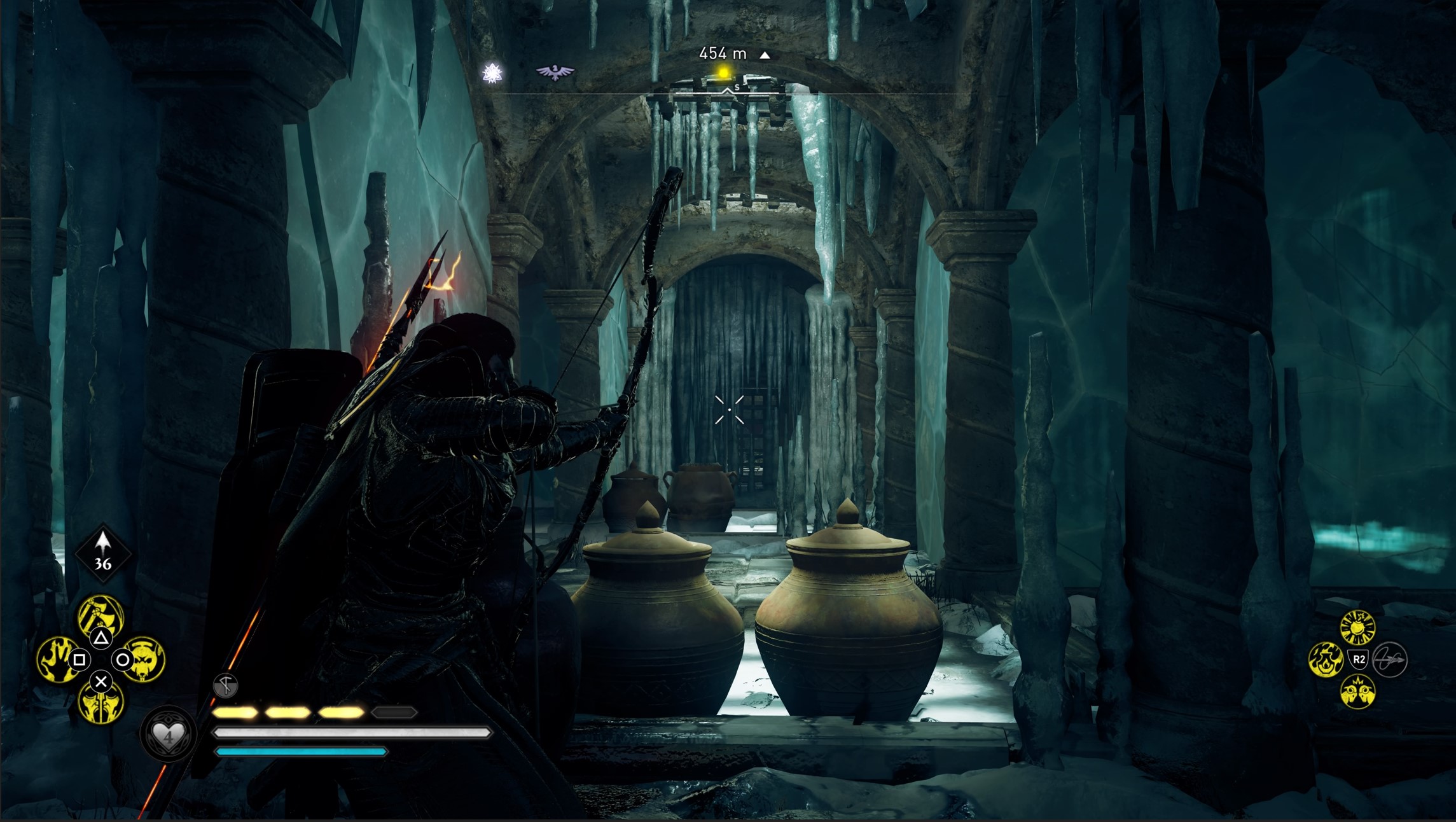

įrom stanzas 22 to 24, more details are given by Odin about Valhalla: the holy doors of the ancient gate Valgrind stand before Valhalla, Valhalla has five hundred and forty doors so eight hundred men can pass through simultaneously (from which the einherjar will flow forth to engage the wolf Fenrir at Ragnarök). Valhalla has spear-shafts for rafters, a roof thatched with shields, coats of mail are strewn over its benches, a wolf hangs in front of its west doors, and an eagle hovers above it. From Valhalla, every day Odin chooses from those killed in combat. Odin describes Valhalla as shining and golden, and it "rises peacefully" as seen from afar. In stanzas 8 to 10 of Grímnismál, the god Odin (in the guise of Grímnir) proclaims Valhalla is in the realm of Glaðsheimr. Valhalla is referenced at length in the Poetic Edda poem Grímnismál, and Helgakviða Hundingsbana II, while Valhalla receives lesser direct references in stanza 33 of the Völuspá, where the god Baldr's death is referred to as the "woe of Valhalla", and in stanzas 1 to 3 of Hyndluljóð, where the goddess Freyja states her intention of riding to Valhalla with Hyndla, in an effort to help Óttar, as well as in stanzas 6 through 7, where Valhalla is mentioned again during a dispute between the two. Hundingbane's Return to Valhalla(1912) by Ernest Wallcousins Poetic Edda According to many researchers, the hǫll element derives from hallr, "rock", and referred to an underworld, not a hall. In Swedish folklore, some mountains traditionally regarded as abodes of the dead were also called Valhall. As philologists such as Calvert Watkins note, the same Indo-European root produced Old Norse hel, a proper noun employed for both the name of another afterlife location and a supernatural female entity as its overseer, as well as the modern English noun hell. Both developed from Proto-Germanic * xallō or * hallō, meaning 'covered place, hall', from the Proto-Indo-European root * kol. It is cognate to Modern English hall and offers the same meaning. The second element, hǫll, is a common Old Norse noun. Among related Old Norse concepts, valr also appears as the first element of the noun valkyrja 'chooser of the slain, valkyrie'. All of these forms descend from the Proto-Germanic masculine noun * walaz.


Valr has cognates in other Germanic languages such as Old English wæl 'the slain, slaughter, carnage', Old Saxon wal-dād 'murder', Old High German 'battlefield, blood bath'. The form " Valhalla" comes from an attempt to clarify the grammatical gender of the word. The Modern English noun Valhalla derives from Old Norse Valhǫll, a compound noun composed of two elements: the masculine noun valr 'the slain' and the feminine noun hǫll 'hall'. The name is rendered in modern Scandinavian languages as Valhöll in Icelandic, while the Swedish and Norwegian form is Valhall, in Faroese it's Valhøll, and in Danish it's Valhal. Valhalla inspired innumerable works of art, publication titles, and elements of popular culture, and is synonymous with a martial (or otherwise) hall of the chosen dead. Valhalla is attested in the Poetic Edda, compiled in the 13th century from earlier traditional sources, in the Prose Edda (written in the 13th century by Snorri Sturluson), in Heimskringla (also written in the 13th century by Snorri Sturluson), and in stanzas of an anonymous 10th century poem commemorating the death of Eric Bloodaxe known as Eiríksmál as compiled in Fagrskinna. Various creatures live around Valhalla, such as the stag Eikþyrnir and the goat Heiðrún, described as standing atop Valhalla and consuming the foliage of the tree Læraðr. Before the hall stands the golden tree Glasir, and the hall's ceiling is thatched with golden shields.

In Valhalla, the dead warriors join the masses of those killed in combat (known as the Einherjar) and various legendary Germanic heroes and kings, as they prepare to aid Odin during the events of Ragnarök. Half of those who die in combat travel to Valhalla upon death, led by valkyries to be with Odin, while the other half gets chosen by the goddess Freyja for the field Fólkvangr. In Norse mythology, Valhalla ( / v æ l ˈ h æ l ə, v ɑː l ˈ h ɑː l ə/ from Old Norse: Valhǫll "hall of the slain") is a majestic, enormous hall located in Asgard, ruled over by the god Odin.


 0 kommentar(er)
0 kommentar(er)
